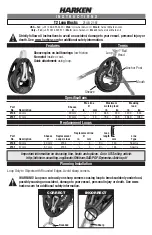
14
Aufstellen und
Bedienungshinweise
Installation and
operating instructions
7. 3. 4 Lichtkabel anschließen
Lichtkabel bis zum Einrasten in die Buchse
3
einschieben (Abb. 5). Lichtkabel nur am Griffstück
anfassen. Niemals am Kabel ziehen.
1
HINWEIS:
Die Lichtentnahmestelle
3
ist mit
einer Blendschutzklappe versehen, die keinen
direkten Lichtaustritt zulässt. Eine Lichtabgabe
erfolgt nur bei eingestecktem Lichtkabel.
3
WARNUNG:
Verbrennnungsgefahr!
Die Lichtquelle sendet Licht
hoher Energie aus, das zu hohen
Oberflächentemperaturen führen
kann (max. 52 °C am Lichtkabel und
max. 43 °C an der Spitze des Endoskops).
Gewebeschäden sind möglich.
7. 3. 4 Connecting light cable
Plug the light cable into the socket
3
as far as it
will go (Fig. 5). Only handle the light cable using the
handle piece. Never pull on the cable.
1
NOTE:
The light outlet
3
is provided with an
antiglare flap, which does not allow any direct
outlet of light. Light is only emitted when the
light cable is inserted.
3
WARNING:
Risk of burning!
The light source transmits high energy
light which can lead to high surface
temperatures (max. 52°C on the light
cable and max. 43°C at the tip of the
endoscope). Tissue damage is possible.
7. 3. 5 Lichtkabel an das Endoskop oder
Videoendoskop anschließen
Lichtkabel mit dem Endoskop verbinden
(Vierteldrehung der Rändelschraube auf dem
Schraubsockel) (Abb. 6 bzw. 7).
1
HINWEIS:
Es wird empfohlen, nur Original
KARL STORZ Lichtkabel zu verwenden.
Lichtkabel anderer Hersteller könnten für die
Lichtübertragung nicht optimal angepasst
sein.
1
HINWEIS:
Nur mit den im Abschnitt 10.3
aufgelisteten KARL STORZ Lichtkabeln ist
der Grad des Schutzes gegen elektrischen
Schlag am Anwendungsteil als Typ CF
nach IEC 60601-1 (defibrillationsgeschützt)
gewährleistet.
7. 3. 5 Connecting the light cable to the
endoscope or videoscope
Connect the light cable to the endoscope by a
quarter turn of the knurled collar on the screw base
(Fig. 6 or 7).
1
NOTE:
The use of original KARL STORZ
light cables only is recommended. Light
cables from other manufacturers may not be
optimally adjusted for light transmission.
1
NOTE:
The degree of protection against
electric shock at the applied part as type
CF according to IEC 60601-1 (defibrillation-
protected) can only be guaranteed by
using the KARL STORZ light cables listed in
Section 10.3.
5
6
7
Montaje e
instrucciones operativas
7. 3. 4 Conexión de cable de luz
Introduzca el cable de luz en el conector
3
hasta
que encastre
(fig. 5)
. Sujete el cable de luz exclusiva-
mente por el mango. No tire nunca del cable.
1
NOTA:
El punto de toma de luz
3
está
provisto de una tapa ciega de protección que
no permite ninguna salida de luz directa. Una
emisión de luz es posible únicamente con el
cable de luz conectado.
3
CUIDADO:
Peligro de quemaduras
La fuente de luz emite luz de alta energía
que puede provocar temperaturas de
superficie elevadas (máx. 52 °C en el
cable de luz y máx. 43 °C en la punta del
endoscopio). Se pueden producir lesiones
en los tejidos.
7. 3. 5 Conexión del cable de luz al
endoscopio o videoendoscopio
Conecte el cable de luz al endoscopio (efectuando
un cuarto de giro del anillo moleteado situado sobre
el zócalo roscado) (fig. 6 ó 7).
1
NOTA:
Se recomienda utilizar únicamente
cables de luz originales de KARL STORZ. Los
cables de luz de otros fabricantes podrían
no estar adaptados de forma óptima para la
transmisión de la luz.
1
NOTA:
Únicamente los cables de luz de
KARL STORZ incluidos en la lista del apartado
10.3 pueden garantizar el grado de protección
contra descargas eléctricas en la pieza de
aplicación del tipo CF según CEI 60601-1
(protección contra desfibrilación).
















































